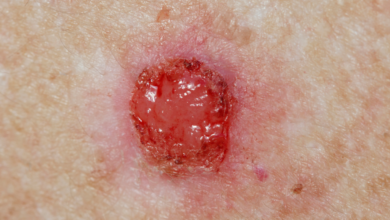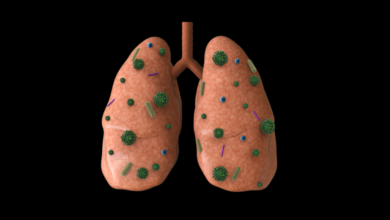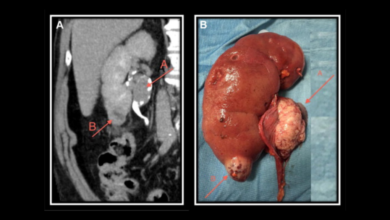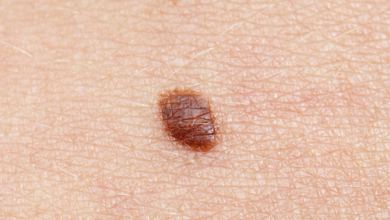
What is Thyroid Cancer?
Thyroid cancer is a type of cancer that develops in the thyroid gland, a butterfly-shaped gland located in the front of the neck.
Types of Thyroid Cancer
There are several types of thyroid cancer, including:
• Papillary thyroid cancer: The most common type, generally with a good prognosis.
• Follicular thyroid cancer: Can be more aggressive than papillary thyroid cancer.
• Medullary thyroid cancer: A less common type that often affects both lobes of the thyroid gland.
• Anaplastic thyroid cancer: A rare and aggressive type of thyroid cancer.
Symptoms of Thyroid Cancer
Early-stage thyroid cancer often doesn’t cause any noticeable symptoms. However, as the cancer grows, symptoms may include:
• A lump in the neck
• Hoarseness or changes in voice
• Difficulty swallowing
• Persistent cough
• Pain in the neck or throat
Causes of Thyroid Cancer
The exact causes of thyroid cancer are not fully understood. However, certain factors may increase the risk, including:
• Radiation exposure: Exposure to radiation, especially in childhood, can increase the risk.
• Family history: A family history of thyroid cancer can increase the risk.
• Genetic syndromes: Certain genetic syndromes, such as multiple endocrine neoplasia type 2 (MEN 2), can increase the risk.
Who Can Suffer from Thyroid Cancer?
Anyone can develop thyroid cancer, but it is more common in women.
Diagnostic Tests for Thyroid Cancer
To diagnose thyroid cancer, a doctor may use a combination of tests, including:
• Physical exam: A physical exam of the neck to check for any lumps or nodules.
• Blood tests: To check thyroid hormone levels and for certain tumor markers.
• Ultrasound: An ultrasound can help visualize the thyroid gland and detect any abnormalities.
• Fine-needle aspiration (FNA): A procedure to remove cells from the thyroid nodule for examination under a microscope.
• CT scan or MRI: These imaging tests can help determine the extent of the cancer.
Stages of Thyroid Cancer
The staging of thyroid cancer helps determine the extent of the disease and guides treatment decisions. The most common staging system is the TNM system, which considers the size of the tumor (T), the spread to nearby lymph nodes (N), and the presence of distant metastases (M).
Treatment of Thyroid Cancer
The treatment for thyroid cancer depends on the stage and type of cancer, as well as the patient’s overall health. Common treatment options include:
• Surgery: To remove all or part of the thyroid gland.
• Radioactive iodine therapy: To destroy any remaining thyroid tissue.
• External beam radiation therapy: To kill cancer cells with high-energy rays.
• Hormone therapy: To suppress thyroid hormone production.
Diet and Thyroid Cancer Prevention
While a specific diet cannot guarantee prevention of thyroid cancer, a balanced diet can contribute to overall health and potentially reduce the risk of certain risk factors. Here are some dietary recommendations:
• A balanced diet: A diet rich in fruits, vegetables, and whole grains can help.
• Limit processed foods and sugary drinks: These can contribute to weight gain and other health problems.
• Maintain a healthy weight: Obesity has been linked to an increased risk of thyroid cancer.
Overall Survival Rate of Thyroid Cancer
The overall survival rate for thyroid cancer is generally high, especially for early-stage, well-differentiated thyroid cancers. However, the prognosis can vary depending on the type of thyroid cancer, its stage, and the individual’s overall health.
Doctor to Consult
An endocrinologist is the best doctor to consult for thyroid cancer.
Diseases Associated with Thyroid Cancer
Thyroid cancer is often associated with other thyroid conditions, such as:
• Hypothyroidism: A condition in which the thyroid gland doesn’t produce enough thyroid hormone.
• Hyperthyroidism: A condition in which the thyroid gland produces too much thyroid hormone.
• Thyroid nodules: Lumps or nodules in the thyroid gland.
How to Prevent Thyroid Cancer
While there’s no guaranteed way to prevent thyroid cancer, the following strategies can reduce the risk:
• Regular check-ups: Regular check-ups with a healthcare provider can help detect any abnormalities early on.
• Limit radiation exposure: Exposure to radiation, especially in childhood, can increase the risk of thyroid cancer.
• Maintain a healthy weight: Obesity has been linked to an increased risk of thyroid cancer.





